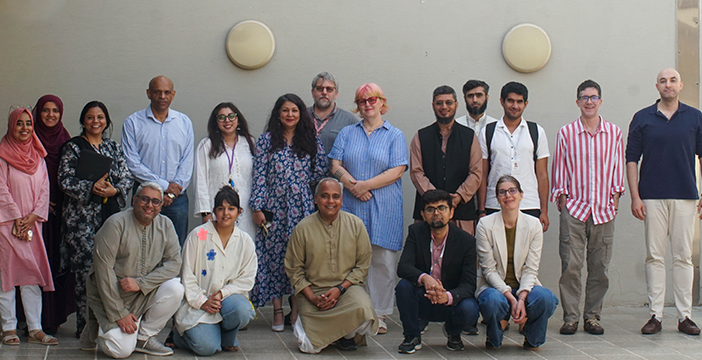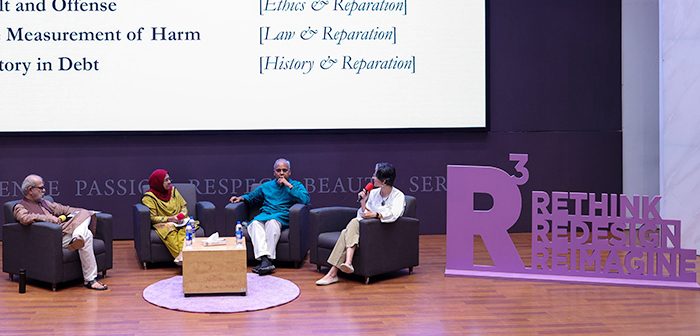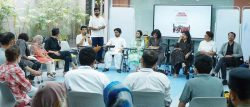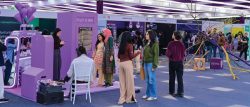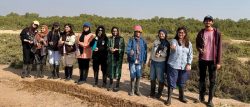At the heart of Habib University’s commitment to transformative education lies a deep investment in pedagogical innovation. In today’s dynamic educational landscape, the boundaries between teacher and learner are increasingly fluid. Educators are facilitators, mentors, and co-learners. Students are not just recipients of information but contributors to knowledge, bringing diverse perspectives, experiences, and insights into the classroom. Pedagogical innovation, whether it is through technology, interdisciplinary approaches, or inclusive practices, serves to deepen this relationship.
At Habib, the Office of Teaching and Learning (OTL) serves as a driving force in shaping academic programs that foster collaboration, innovation, and meaningful student success. Beyond supporting faculty in curriculum design and pedagogical development, the OTL cultivates a vibrant intellectual community where educators feel a sense of belonging and shared purpose. By prioritizing contextually relevant course content and inclusive teaching practices, the office ensures that learning resonates with students’ lived experiences while equipping them to engage critically with global challenges.
A Catalyst for Faculty Growth
To fulfill these goals, OTL organizes the annual Pedagogical Development Week (PDW). This initiative serves as a cornerstone for faculty development, equipping educators with the tools and insights needed to meet the evolving demands of new generations of undergraduates. Beyond staying up to date with the shifting academic dynamics, PDW reinforces the university’s core values, ensuring that courses remain contextually relevant and teaching methods are both innovative and responsive to student needs. Through workshops, discussions, and collaborative sessions, faculty engage with cutting-edge pedagogical strategies, from inclusive classroom practices to the latest in educational technology, fostering an environment where learning is dynamic, meaningful, and continues beyond the university’s doors.
Central to PDW is Habib University’s commitment to holistic education, exemplified by initiatives like CPAC (Content, Pedagogy, Assessment, Community), which reimagines assessment as a fair, developmental process rather than a mere memory test. Faculty explore how learning extends beyond traditional classroom boundaries, embracing transdisciplinary approaches that bridge disciplines and ignite curiosity. These sessions highlight the importance of designing courses that not only captivate students but also cultivate adaptable, critical thinkers prepared to navigate a rapidly changing global landscape. By fostering intergenerational dialogue and collaborative problem-solving, PDW ensures that Habib’s academic community remains at the forefront of pedagogical excellence, where teaching is not just about imparting knowledge but about shaping ethical, engaged citizens of the world.
Healing Through Learning
This year’s Pedagogical Development Week (PDW) at Habib University focused on themes that span the personal, pedagogical, and institutional, examining our teaching practices, our students’ needs, and the broader structures that shape higher education. It also underscores Habib University’s commitment to teaching, learning, and innovation. Education has long been seen as a pathway to opportunity. Still, increasingly, it is being reimagined as a tool for reparation, not as a symbolic gesture, but as a pedagogical imperative. We ask, what does it mean to repair in the context of higher education? What forms of knowledge, relationships, and institutional structures require reimagining?
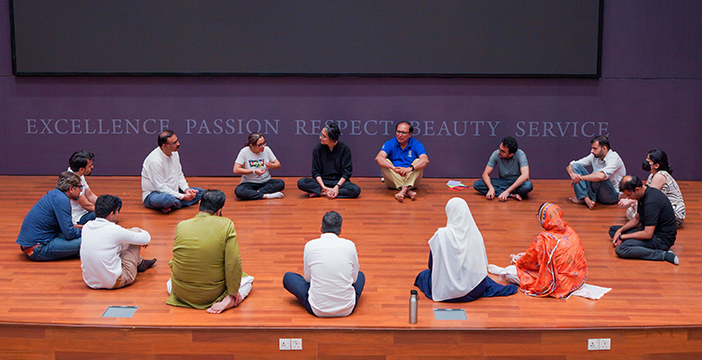
Modern education systems often reflect a fragmented understanding of knowledge – divided by disciplines, shaped by colonial legacies, and disconnected from lived realities. This fragmentation is not accidental; it is the result of historical processes that have privileged certain ways of knowing while marginalizing others. Reparation through education begins by acknowledging this rupture. To repair knowledge is to reweave the threads, to bring together the scientific and the spiritual, the local and the global, the theoretical and the experiential. It means recognizing that wisdom exists in oral traditions, community practices, and indigenous epistemologies just as much as in textbooks and academic journals. This approach challenges the compartmentalization of learning, encouraging interdisciplinary learning that reflects the complexity of real-world issues. It promotes contextual learning rooted in place, culture, and community, as well as dialogic pedagogy where students and teachers co-create meaning across boundaries.
Reparative education is about how we teach. It involves creating spaces where learners can bring their whole selves. It is about valuing emotional, cultural, and historical dimensions of knowledge. It is also about teaching with humility, curiosity, and a commitment to justice. In this vision, education becomes a form of healing, a way to mend what has been broken, to reconnect what has been separated, and to restore dignity to those whose knowledge has been denied.
From community-rooted STEM and playful pedagogies to generative AI, prophetic traditions, and intergenerational collegiality, Pedagogical Development Week 2025 offered an inquiry into the possibilities of repair. It invites us to imagine education not as a neutral transmission of knowledge, but as an intentional act of restoration, where fragmented histories are reassembled, silenced voices are amplified, and learning becomes a collective journey toward justice, healing, and wholeness.
From 4th to 8th August, Pedagogical Development Week consisted of various sessions such as Cultivating Positive Community-engaged Learning Experiences in STEM courses, workshops on playful teaching, engaging Gen Z with Design and AI, AI in the liberal arts classroom, supporting student learning through assessments in the age of Generative AI with faculty from Olin College, Carleton College, George Washington University, and from universities across Pakistan.
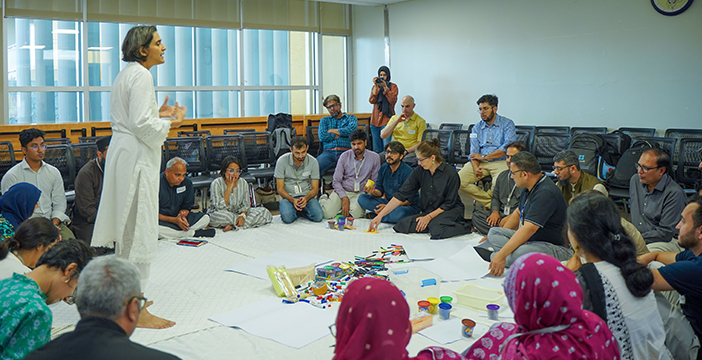
Voices of Thought Leaders and Practitioners
These exciting sessions engaged with themes of inclusivity, wisdom, student success, SoTL and more. Noorulain Masood, an educator, practitioner, and writer, delivered a session titled, “From Self to Clasroom: Living Yohsin,” in which she explored how the five values of Yohsin (thoughtful self-cultivation) can be embodied in everyday teaching and learning practices. Muhammad Suleiman Qureshi, along with alumni Syeda Ailiya Fatima Rizvi, and Marya Darukhanawalla, discussed the Gen Z mindset in navigating education in the age of AI in the session, “How Students Learn in the Age of AI.” Dr Karen Singer-Freeman’s session, SoTL – Treating the Classroom As an Experiment, guided participants through the complete process of conducting publishable Scholarship of Teaching and Learning (SoTL) research. AI in the Liberal Arts Classroom by George Cusack presented faculty with an overall framework for defining the role of generative AI technology in their classes.
Building Classrooms as Ecosystems of Curiosity and Presence
As Muneera Batool, Associate Dean of Teaching and Learning, remarked, “We see classrooms as ecosystems that cultivate presence and curiosity.” Reparative work, she said, is collective, and Habib University, through Pedagogical Development, is committed to fostering this collective growth by equipping faculty with the tools, mindset, and support needed to create transformative learning experiences. Through initiatives like these, Habib University’s Pedagogical Development programs not only advance teaching excellence but also nurture a community where inclusivity, curiosity, and critical engagement thrives, ensuring that both educators and students are active participants in shaping meaningful, future-ready education.
